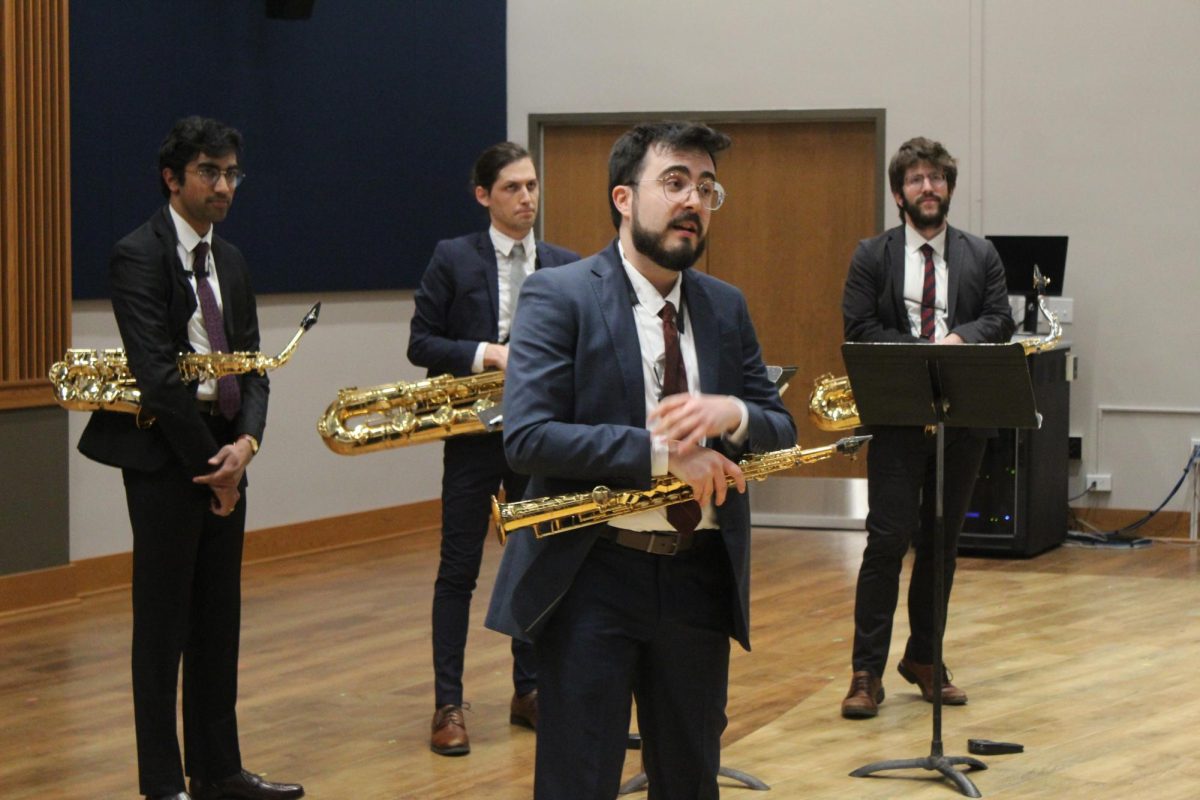Denkmann’s Wallenberg Hall was stuffed with students, faculty and community members alike this past Tuesday, Feb. 11. Only a few empty seats peppered the edges of the audience, and five microphones sat alone in a row on the stage. Everyone was there to see a group that had traveled more than 4,000 miles to perform.
The crowd fell silent, as the group stepped up to the microphones. The first notes of an hour-long concert, followed by two enthusiastically requested encores, floated through the room – sound created by textured, energetic and meaningful a capella singing.
The Real Group is a Swedish a cappella group that has toured and performed for more than 30 years. Their name is a play on a series of vocal jazz books called “The Real Books,” staples of the group’s repertoire early in their career.
They describe their style as a cross between “jazz, pop, and Northern European choral music.” The result is a dynamic and versatile group that performs everything from musical theater parodies with audience participation, to Latvian folk songs, to textured arrangements of a capella classics like Chili Con Carne.
Over the years, the group has seen members come and go, but current member, Anders Edenroth, is one of the original five students from the Royal Academy of Music in Stockholm who started the group.
It was a series of fortunate coincidences that led the Real Group to Wallenberg Hall. While touring through the states, they got in touch with Dr. Jon Hurty, director of the Augustana Choir through their agent.
It took about a month to figure out when, where and how the Real Group could perform on campus, but by the end of the J-Term, it was a done deal. The Wallenberg Foundation, administered by Mark Safstrom and the Scandinavian Studies program, funded the project.
Though the group wasn’t cheap, the Wallenberg Foundation thought hosting them would be worthwhile, as their Swedish vocal jazz fit perfectly with Augustana’s background in Swedish tradition.
One of the performers even pointed out the Swedish text that arcs over the entrance to Wallenberg Hall, saying it wasn’t every day that they performed at an American college with Swedish on the walls.
An interesting aspect of the Real Group is its use of music as not just something to enjoy passively, but to actively engage the audience in issues they communicate through their performance.
“I think something that makes them really unique is their combination of music and social justice,” Hurty said.
One of their original song performances revolved around water, access to water and the ways in which those with money can restrict and control something as vital as water.
The Real Group’s website even states that they look to “integrate artistic aspirations with human rights, ecological awareness, global concern and a feministic mindset.”
Hand-in-hand with this approach to performance is an openness to communicate with the audience. Senior Katie Griswold, a fan of the group since high school, said that this was one of her favorite parts of their performance.
“The group talked to the audience as if they had known each of them for a long time and were so kind and funny and charismatic onstage,” Griswold said. “They didn’t have that whole ‘high and mighty’ vibe that other famous performers have.”
On top of that, the concert lived up to all of Griswold’s expectations. “Seeing them in concert was a surreal experience because they truly sounded exactly like their recordings,” Griswold said.
First-year Brian Heffernan also attended the performance. Unlike Griswold , this was the first time Heffernan had heard the group.
“I haven’t really listened to a ton of vocal jazz,” Heffernan said. “But I was completely blown away by the performance. The music they did was catchy and they seemed like they were having so much fun onstage.”
Following the night of the performance, the group conducted a workshop where they listened to the Augustana Choir and offered tips on how to improve.
During a question and answer session, the group talked at length about the importance of collaboration and trust in musical ensembles, reaffirming their inclusion of social issues and saying something meaningful with their art.
It may just be that dedication and belief in something beyond the mere fun of performance that makes the Real Group feel so, well, real.










































































































